
last two verses of surah Baqarah
The Holy Quran | Surah Al-Baqarah | reading Surah Baqarah last 2 ayat in English Hindi Urdu bangla, last two verses of surah baqarah to read online (Surah Baqarah ki akhri ayat) pdf & mp3 audio free download.

Surah Baqarah last 2 ayat in Arabic
- 2:285 آمَنَ الرَّسُولُ بِمَا أُنْزِلَ إِلَيْهِ مِنْ رَبِّهِ وَالْمُؤْمِنُونَ ۚ كُلٌّ آمَنَ بِاللَّهِ وَمَلَائِكَتِهِ وَكُتُبِهِ وَرُسُلِهِ لَا نُفَرِّقُ بَيْنَ أَحَدٍ مِنْ رُسُلِهِ ۚ وَقَالُوا سَمِعْنَا وَأَطَعْنَا ۖ غُفْرَانَكَ رَبَّنَا وَإِلَيْكَ الْمَصِيرُ
285: The Messenger has believed in what was revealed to him from his Lord, and [so have] the believers. All of them have believed in Allah and His angels and His books and His messengers, [saying], "We make no distinction between any of His messengers." And they say, "We hear and we obey. [We seek] Your forgiveness, our Lord, and to You is the [final] destination."
2:286 لَا يُكَلِّفُ اللَّهُ نَفْسًا إِلَّا وُسْعَهَا ۚ لَهَا مَا كَسَبَتْ وَعَلَيْهَا مَا اكْتَسَبَتْ ۗ رَبَّنَا لَا تُؤَاخِذْنَا إِنْ نَسِينَا أَوْ أَخْطَأْنَا ۚ رَبَّنَا وَلَا تَحْمِلْ عَلَيْنَا إِصْرًا كَمَا حَمَلْتَهُ عَلَى الَّذِينَ مِنْ قَبْلِنَا ۚ رَبَّنَا وَلَا تُحَمِّلْنَا مَا لَا طَاقَةَ لَنَا بِهِ ۖ وَاعْفُ عَنَّا وَاغْفِرْ لَنَا وَارْحَمْنَا ۚ أَنْتَ مَوْلَانَا فَانْصُرْنَا عَلَى الْقَوْمِ الْكَافِرِينَ286: Allah does not charge a soul except [with that within] its capacity. It will have [the consequence of] what [good] it has gained, and it will bear [the consequence of] what [evil] it has earned. "Our Lord, do not impose blame upon us if we have forgotten or erred. Our Lord, and lay not upon us a burden like that which You laid upon those before us. Our Lord, and burden us not with that which we have no ability to bear. And pardon us; and forgive us; and have mercy upon us. You are our protector, so give us victory over the disbelieving people."
Surah Baqarah last 2 ayat in English
last two verses Transliteration
285: Amana alrrasoolu bima onzila ilayhi min rabbihi waalmuminoona kullun amana biAllahi wamalaikatihi wakutubihi warusulihi la nufarriqu bayna ahadin min rusulihi waqaloo samiAAna waataAAna ghufranaka rabbana wailayka almaseeru
286: La yukallifu Allahu nafsan illa wusAAaha laha ma kasabat waAAalayha ma iktasabat rabbana la tuakhithna in naseena aw akhtana rabbana wala tahmil AAalayna isran kama hamaltahu AAala allatheena min qablina rabbana wala tuhammilna ma la taqata lana bihi waoAAfu AAanna waighfir lana wairhamna anta mawlana faonsurna AAala alqawmi alkafireena
Surah Baqarah Last 2 Ayats Translation in English
We try our best to translate, keeping in mind the Italian saying: "Traduttore, traditore", which means: "Translation is a betrayal of the original text".
Surah Baqarah Last 2 Ayats In Arabic Text Form
﴿ آمَنَ الرَّسُولُ بِمَا أُنزِلَ إِلَيْهِ مِنْ رَبِّهِ وَالْمُؤْمِنُونَ كُلٌّ آمَنَ بِاللَّهِ وَمَلائِكَتِهِ وَكُتُبِهِ وَرُسُلِهِ لا نُفَرِّقُ بَيْنَ أَحَدٍ مِنْ رُسُلِهِ وَقَالُوا سَمِعْنَا وَأَطَعْنَا غُفْرَانَكَ رَبَّنَا وَإِلَيْكَ الْمَصِيرُ (*) لا يُكَلِّفُ اللَّهُ نَفْساً إِلاَّ وُسْعَهَا لَهَا مَا كَسَبَتْ وَعَلَيْهَا مَا اكْتَسَبَتْ رَبَّنَا لا تُؤَاخِذْنَا إِنْ نَسِينَا أَوْ أَخْطَأْنَا رَبَّنَا وَلا تَحْمِلْ عَلَيْنَا إِصْراً كَمَا حَمَلْتَهُ عَلَى الَّذِينَ مِنْ قَبْلِنَا رَبَّنَا وَلا تُحَمِّلْنَا مَا لا طَاقَةَ لَنَا بِهِ وَاعْفُ عَنَّا وَاغْفِرْ لَنَا وَارْحَمْنَا أَنْتَ مَوْلانَا فَانصُرْنَا عَلَى الْقَوْمِ الْكَافِرِينَ ﴾
[ سورة البقرة: 285 - 286]
Surah Baqarah Last 2 Ayats tafseer
285.. This verse outlines what one is required to believe in and what should be the distinguishing characteristics of one's conduct. They consist of the following: belief in God, in His angels, in His Books, in all His Messengers (instead of some rather than others), and in the fact that ultimately one will have to stand before God's judgement. These are the five fundamental articles of faith in Islam. Having accepted them, the only proper attitude for a Muslim is to cheerfully accept and follow whatever directives he receives from God. Instead of exulting in his moral excellence he should be humble and should constantly seek God's forgiveness and mercy.
286. Man's answerability to God is limited by the extent of his ability. If a man does not have the ability to do a certain thing, God will not take him to task for not having performed it. In the same way, if it is really beyond a man's ability to abstain from something, God will not blame him for having failed to abstain from it. It should be noted here that man will not be the final judge as to whether he had the ability to do something or not. Such judgement will be made by God alone.
*339). This is the second fundamental principle of God's law of retribution. Every man will be rewarded for the services he has rendered, none will be rewarded for services rendered by others. The same applies to punishment. It is the one who is guilty who will be punished. It is possible, however, that if a man has initiated either good or bad practices, they will continue to affect people's lives. The resulting good and bad deeds of people will be reckoned either to their credit or against them, since they are clearly related to their efforts and actions. It is impossible, however, that a map should be either rewarded for an act of goodness or punished for an act of evil in which he has had no share - neither by intent nor practical action. The requital of acts is not transferable.
*340). The prayer made here is that God should not subject them to the severe tests and the terrible persecutions and hardships undergone by their predecessors. It is God's law that those who commit themselves to follow Truth and righteousness are subjected to severe tests and tribulations, and it is a believer's duty to meet them with patience and fortitude. At the same time, the believer should always pray that God may make it easy for him to follow the path of Truth and righteousness.
*341). Believers pray to God not to place unon them a burden beyond their capacity of endurance, and to subject them only to those tests from which they may emerge triumphant. May it not happen that the hardships are too much for them to bear, and that their feet falter and are turned away from the path of righteousness,
*342). In order to appreciate fully the spirit of this prayer, one should remember that these verses were revealed on the occasion of the ascension of the Prophet, a year before his migration to Madina. At that time the struggle between Islam and unbelief had reached its climax. Not only in Makka, but throughout the Arabian peninsula, there was no place where the lives of those who wished to follow the religion of God had not been made extremely difficult. In these circumstances the Muslims were told in what manner they ought to pray to their Lord. It is obvious that if the bestower himself tells one how to present one's request, the granting of the request becomes virtually assured. Hence, this prayer greatly strengthened the hearts of the Muslims. Moreover, this prayer implicitly taught the Muslims not to allow their feelings to flow along undesirable channels. They should instead mould them into a prayer to their Lord.
Think of the heart-rending cruelties to which the Muslims were subjected merely because of their devotion to Truth, and then turn to the contents of this prayer, where there is no trace of bitterness against the enemies. Consider the physical afflictions and material losses which the Muslims suffered, then note how this prayer does not contain the slightest hint of worldly ambition. Compare the wretchedness and misery of these devotees of Truth with the pure, exalted feelings with which this prayer is overflowing. This comparison will enable us to appreciate the nature of the spiritual and moral training provided to men of faith.
last two ayat with urdu translation
رسول اُس ہدایت پر ایمان لایا ہے جو اس کے رب کی طرف سے اس پر نازل ہوئی ہے اور جو لوگ اِس رسول کے ماننے والے ہیں، انہوں نے بھی اس ہدایت کو دل سے تسلیم کر لیا ہے یہ سب اللہ اور اس کے فرشتوں اوراس کی کتابوں اور اس کے رسولوں کو مانتے ہیں اور ان کا قول یہ ہے کہ: "ہم اللہ کے رسولوں کو ایک دوسرے سے الگ نہیں کرتے، ہم نے حکم سنا اور اطاعت قبول کی مالک! ہم تجھ سے خطا بخشی کے طالب ہیں اور ہمیں تیری ہی طرف پلٹنا ہے"
اللہ کسی متنفس پر اُس کی مقدرت سے بڑھ کر ذمہ داری کا بوجھ نہیں ڈالتا ہر شخص نے جو نیکی کمائی ہے، اس کا پھل اسی کے لیے ہے اور جو بدی سمیٹی ہے، اس کا وبال اسی پر ہے (ایمان لانے والو! تم یوں دعا کیا کرو) اے ہمارے رب! ہم سے بھول چوک میں جو قصور ہو جائیں، ان پر گرفت نہ کر مالک! ہم پر وہ بوجھ نہ ڈال، جو تو نے ہم سے پہلے لوگوں پر ڈالے تھے پروردگار! جس بار کو اٹھانے کی طاقت ہم میں نہیں ہے، وہ ہم پر نہ رکھ، ہمارے ساتھ نرمی کر، ہم سے در گزر فرما، ہم پر رحم کر، تو ہمارا مولیٰ ہے، کافروں کے مقابلے میں ہماری مدد کر
last two ayat in Bangla tarjuma
রসূল বিশ্বাস রাখেন ঐ সমস্ত বিষয় সম্পর্কে যা তাঁর পালনকর্তার পক্ষ থেকে তাঁর কাছে অবতীর্ণ হয়েছে এবং মুসলমানরাও সবাই বিশ্বাস রাখে আল্লাহর প্রতি, তাঁর ফেরেশতাদের প্রতি, তাঁর গ্রন্থসমুহের প্রতি এবং তাঁর পয়গম্বরগণের প্রতি। তারা বলে আমরা তাঁর পয়গম্বরদের মধ্যে কোন তারতম্য করিনা। তারা বলে, আমরা শুনেছি এবং কবুল করেছি। আমরা তোমার ক্ষমা চাই, হে আমাদের পালনকর্তা। তোমারই দিকে প্রত্যাবর্তন করতে হবে।
আল্লাহ কাউকে তার সাধ্যাতীত কোন কাজের ভার দেন না, সে তাই পায় যা সে উপার্জন করে এবং তাই তার উপর বর্তায় যা সে করে। হে আমাদের পালনকর্তা, যদি আমরা ভুলে যাই কিংবা ভুল করি, তবে আমাদেরকে অপরাধী করো না। হে আমাদের পালনকর্তা! এবং আমাদের উপর এমন দায়িত্ব অর্পণ করো না, যেমন আমাদের পূর্ববর্তীদের উপর অর্পণ করেছ, হে আমাদের প্রভূ! এবং আমাদের দ্বারা ঐ বোঝা বহন করিও না, যা বহন করার শক্তি আমাদের নাই। আমাদের পাপ মোচন কর। আমাদেরকে ক্ষমা কর এবং আমাদের প্রতি দয়া কর। তুমিই আমাদের প্রভু। সুতরাং কাফের সম্প্রদায়ের বিরুদ্ধে আমাদের কে সাহায্যে কর।
Surah Baqarah ki akhri 2 ayat in hindi
रसूल उस चीज़ पर ईमान लाया, जो उसके लिए अल्लाह की ओर से उतारी गई तथा सब ईमान वाले उसपर ईमान लाये। वे सब अल्लाह तथा उसके फ़रिश्तों और उसकी सब पुस्तकों एवं रसूलों पर ईमान लाये। (वे कहते हैः) हम उसके रसूलों में से किसी के बीच अन्तर नहीं करते। हमने सुना और हम आज्ञाकारी हो गये। हे हमारे पालनहार! हमें क्षमा कर दे और हमें तेरे ही पास[1] आना है।
अल्लाह किसी प्राणी पर उसकी सकत से अधिक (दायित्व का) भार नहीं रखता। जो सदाचार करेगा, उसका लाभ उसी को मिलेगा और जो दुराचार करेगा, उसकी हानि भी उसी को होगी। हे हमारे पालनहार! यदि हम भूल चूक जायें, तो हमें न पकड़। हे हमारे पालनहार! हमारे ऊपर इतना बोझ न डाल, जितना हमसे पहले के लोगों पर डाला गया। हे हमारे पालनहार! हमारे पापों की अनदेखी कर दे, हमें क्षमा कर दे तथा हमपर दया कर। तू ही हमारा स्वामी है तथा काफ़िरों के विरुध्द हमारी सहायता कर।
Read: Ayatul KursiList The Holy Quran | Surah Name: Al-Baqarah - Narrated by : Hafs from Asim
Surah Baqarah last 2 ayat pdf
Download surah baqarah last 2 ayat pdf

Recitation Quran
You can download the whole Quran with a translator or choosing another chapter in the list .
Download Quran
Download whole Quran : Download Koran .
Fahras Qur’an
Choose a surah from the following list : List of suras.
Download surah Al-Baqarah mp3 :
surah Al-Baqarah mp3 : choose the reciter to listen and download the chapter Al-Baqarah Complete with high quality
 Maher Al Muaiqly
Maher Al Muaiqly
 Mohamed Ayoub
Mohamed Ayoub
 Al Muhaisni
Al Muhaisni
 Muhammad Jibril
Muhammad Jibril
 Al Minshawi
Al Minshawi
 Al Hosary
Al Hosary
 Mishari Al-afasi
Mishari Al-afasi
 Nasser Al Qatami
Nasser Al Qatami
 Wadih Al Yamani
Wadih Al Yamani
 Yasser Al Dosari
Yasser Al Dosari









